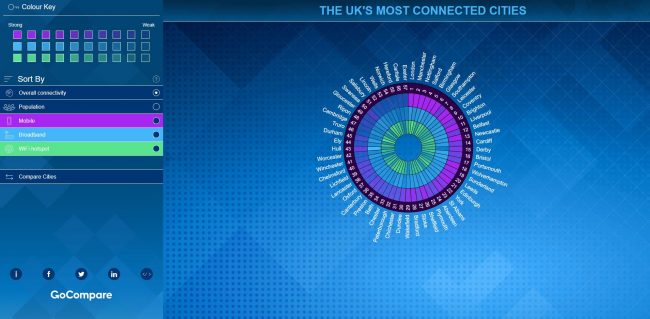Is Your Business A Victim Of Digital Inequality?
- Anthony
- June 19, 2018
- 01:12 PM
- No Comments
How access to broadband can have a real impact on your bottom line.
The problem of digital inequality has been starkly illustrated by a new study from comparison service GoCompare. Looking at 57 major business hubs across the country, the research has revealed significant differences in the availability of high-speed broadband and mobile internet.
Displayed in a colourful, interactive graphic, the results reflect overall connectivity, population, 4G availability, average download speeds and the number of people per wi-fi hotspot.
Surprising no one, London comes out on top for overall connectivity. Its 4G coverage of 60.92% is the best in the country, along with Manchester and Nottingham, and when it comes wi-fi hotspots, its number one in that respect too.
For overall connectivity, Exeter is last on the list, no doubt thanks to average download speeds of 26.84Mbps and only 6.31% 4G coverage.
And while that 4G coverage might sound bad, it’s not the worst in the country. In fact, several cities have even less access to 4G, including Hereford, with a worrying 0%.
 GoCompare's figures show that London still leads the charge for connectivity.
GoCompare's figures show that London still leads the charge for connectivity.
Why Does Digital Inequality Matter?
Although the digital divide has narrowed, 4% of homes and offices in the UK are still unable to get a decent broadband, according to Ofcom. That equates to 1.1 million properties. The government made a promise last year that by 2020, everyone would have access to download speeds of at least 10Mbps and upload speeds of 1Mbps. With 18 months to go, more investment is going to be needed to get the final 4% up to speed.
But is it really that important for businesses to have fast broadband speeds?
That, of course, depends on the type of business, but in the majority of cases, yes, it really does make a difference. The internet is not only the home of business websites, it’s also a primary medium for corporate communications, whether you’re talking to colleagues, partners or customers. As well as email, you need the internet for VoIP, instant messaging and video calls. If you can’t offer all these avenues of communication but your competitors can, you risk falling behind.
The emergence of software as a service (SaaS) is also important. Cloud-based tools like Salesforce, Autotask, Office 365 and so on can give firms a real competitive edge, but a reliable internet connection is a must.
Even cyber security and disaster recovery are massively enhanced by the internet, thanks to cloud backups and online threat analysis.
And, of course, the web is the world’s greatest research tool. If you want to be in touch with what’s happening in the world, with your business sector and with your customers, it will most likely happen via the internet.
Poor mobile internet, meanwhile, limits the viability of flexible working and can have an impact on businesses whose employees spend a lot of time on the road, hampering communication and the ability to work remotely.

What Can You Do About It?
The minimum speeds set by the government aren’t just a recommendation; they’re a legal right. As part of the Universal Service Obligation, which aims to tackle digital inequality, we’ll all have the right to demand faster broadband if we’re not getting the minimum speeds. When this rule is implemented in 2020, all providers will be obligated to fulfil such requests – provided they don’t go over the cost threshold of £3,400.
In the meantime, if your broadband isn’t up to scratch, it’s possible you could benefit by changing your supplier, particularly if you’re able to move over to an internet service provider that offers cable or fibre connections. You can also improve matters by moving over to an business-class connection, if you’re not already using one, because the fastest speeds are usually reserved for such services.
If you're already on the fastest connection available in your area and it's still too slow, you could perhaps gain some speed by tweaking system and network settings in your office (or asking your IT support firm to do so). But there are no guarantees such an approach will get your anything more than miniscule gains.
Ultimately, it might simply be the case that more infrastructure investment is needed in your area. If that's the case, there may be little you can do, other than wait and hope things get better.
Do you need help choosing the right broadband package for your business? Contact TMB, and find out how we can help.

